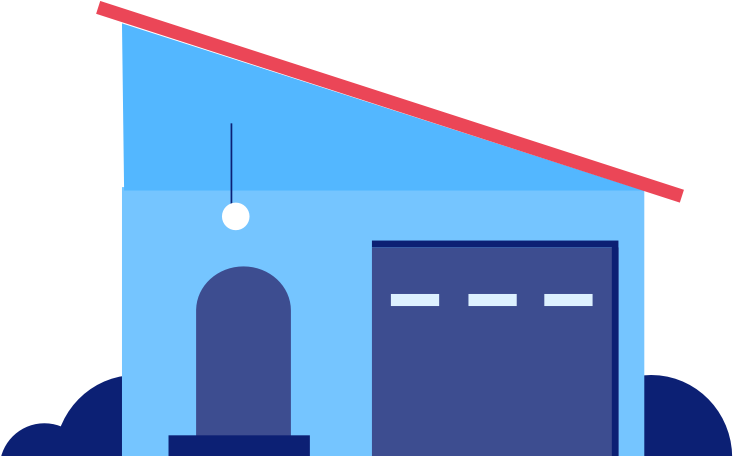
If you’re just beginning your research into the mortgage process, you may be feeling some uncertainty about which type of loan will fit your needs. Luckily, there are first-time home buyer loans with zero or low down payment options and programs that could help you bring your dream of homeownership to life. Here are some options for first-time home buyer loans based on their benefits and affordability.
Conventional fixed-rate loans: for buyers with higher credit scores
Conventional fixed-rate loans are one of the most common types of home loans. If you have good credit and a low debt-to-income ratio (the ratio of total monthly debt payments – not including utilities, cell phone or cable service – compared to gross monthly income), a conventional fixed-rate loan may be a good option for you. Benefits could include predictable monthly principal and interest payments, lower interest rates and a flexible down payment.
You may be able to make a down payment as low as 3%. However, making a down payment that is 20% of the home’s purchase price may allow you to eliminate private mortgage insurance (PMI). While your credit score is important, you could qualify for a conventional loan with a credit score as low as 620, but you’ll need a more substantial down payment (up to 20% depending on your situation). And when it comes to down payments, paying more up front could help lower your monthly principal and interest payments.
FHA loans: for buyers with lower credit scores and limited savings
Federal Housing Administration (FHA) loans are popular among first-time home buyers since they offer lower credit score and down payment requirements. They often have more flexible lending requirements than conventional loans. Even with a weaker credit score, you may only be required to put 3.5% down. Keep in mind, putting less down could result in a higher interest rate.
All FHA loans require mortgage insurance. It protects the lender against any loss if you fail to pay your mortgage. A mortgage insurance premium (MIP) includes an upfront fee (paid at closing) and a monthly cost (added to your monthly principal and interest payment). You may be able to roll the upfront fee into your mortgage if you don’t have enough cash on hand to pay the upfront fee. But, your loan amount and the overall cost of your loan may increase.
VA loans: for active-duty military members, veterans and their spouses
Veterans Affairs (VA) loans are home mortgages backed by the Department of Veterans Affairs. With a VA loan, active service members, veterans and eligible surviving spouses can buy a home with little or no down payment. Even with no down payment, VA loans do not require mortgage insurance. Because the VA guarantees a portion of your loan, you save on this monthly expense.
A Certificate of Eligibility from the VA will show whether you qualify based on your service history and duty status. Your mortgage loan officer will work with you to obtain the Certificate of Eligibility. Our flexible qualification guidelines for VA loans make it a good option for active-duty military members, veterans and their spouses who are looking to buy a home.
USDA loans: for buyers with lower to moderate incomes in eligible rural areas
United States Department of Agriculture (USDA) loans are mortgages guaranteed by the U. S. Department of Agriculture. A USDA loan can be a good option for home buyers on a budget that are flexible about where they live. They offer zero down payment loans with low interest rates and typically have more flexible credit requirements than conventional mortgages.
To be eligible for a USDA loan, the home must meet certain requirements. It must be your primary residence in a rural community with a population of less than 35,000. Rental properties and vacation homes do not qualify.
Minimum down payments for first-time home buyer loans
|
Mortgage type |
Minimum down payment |
Other restrictions? |
|---|---|---|
|
Conventional fixed-rate loans |
3% |
The loan limit varies by region but is generally set at $726,200. |
|
FHA loans |
3.5% |
The maximum home price in most areas is $356,362 but can be as much as $1,089,300 where home prices are higher. |
|
VA loans |
0% |
Borrower must be a Military Service Veteran, currently active military service personnel or a surviving spouse. |
|
USDA loans |
0% |
Home must be in a rural area with a population of less than 35,000. |
Mortgage type
Conventional fixed-rate loans
Minimum down payment
3%
Other restrictions?
The loan limit varies by region but is generally set at $726,200.
Mortgage type
FHA loans
Minimum down payment
3.5%
Other restrictions?
The maximum home price in most areas is $356,362 but can be as much as $1,089,300 where home prices are higher.
Mortgage type
VA loans
Minimum down payment
0%
Other restrictions?
Borrower must be a Military Service Veteran, currently active military service personnel or a surviving spouse.
Mortgage type
USDA loans
Minimum down payment
0%
Other restrictions?
Home must be in a rural area with a population of less than 35,000.

Prequalification helps you see how much you might be able to borrow.
First-time home buyer programs: for buyers who need closing cost or down payment assistance
First-time home buyer programs across the U.S. offer loans, grants, tax credits1 and other down payment assistance programs. They’re designed to help eligible buyers cover down payment or even closing costs. Federal, state, county or local government agencies, nonprofits or employers offer these programs. Availability and qualification requirements vary by state.
The American Dream program, offered by U.S. Bank, helps consumers with limited resources become homeowners, especially low-to-moderate income (LMI) borrowers and in LMI neighborhoods. Contact a U.S. Bank mortgage loan officer for more information about programs available near you.
Buying a home is an exciting milestone. It’s important to consider the benefits of different first-time home buyer loans before deciding which option is right for you. There are also programs available to help eligible buyers cover some or all of their down payment and closing costs. Our mortgage loan officers are a great resource for helping you understand your options.

Let’s get you closer to your new home.
An experienced mortgage loan officer is just a phone call or email away, with answers for just about any home-buying question.
Related topics

How much house can I afford?
See how much house you could afford.

What is the average down payment on a house?
Read about saving for a down payment.

FHA vs. conventional loans
Compare these popular mortgage types.

